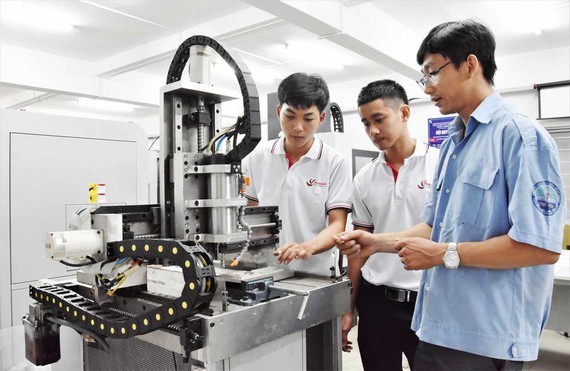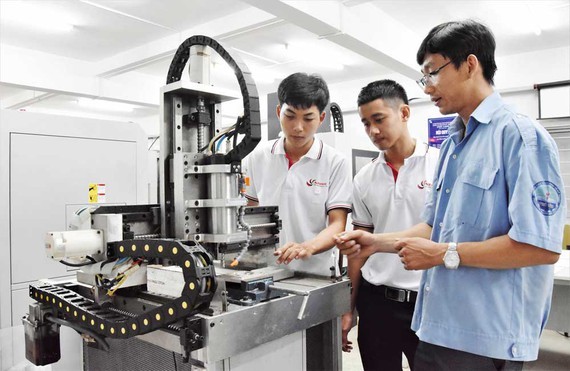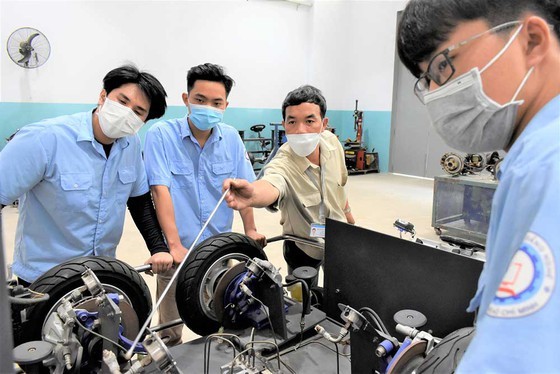

Decree No.81/2021 on the mechanism for collecting and managing tuition fees of educational institutions following the national education program; policies on tuition fee exemption, reduction, and financial aid for learning; service fees in education and training sectors (Decree 81) clearly states that the tuition of the academic year of 2021-2022 is not more than the top limit of that year. However, from the following year, new tuitions will be applied.
Accordingly, among public non-financial-autonomy higher educational institutes that offer general undergraduate programs, the tuition top limits are determined by majors:
_Teacher training, business, administration, law majors: increase by VND2.7 million (US$116.4) to VND12.5 million a year ($539)
_Arts majors: increase by VND0.3 million ($13) to VND12 million a year ($517)
_Natural science, life science majors: increase by VND0.8 million ($34.5) to VND13.5 million a year ($582)
_Math, statistics, computer science, IT, technology majors: increase by VND2.8 million ($121) to VND14.5 million a year ($625)
_Pharmacy and healthcare majors: increase by VND10.2 million ($440) to VND24.5 million a year ($1,056)
_Social science, journalism, social service majors: increase by VND2.2 million ($95) to VND12 million a year ($517).
The tuition top limits of public financially autonomous universities double the above fees. As to universities that have guaranteed recurrent expenditure and investment expenditure entirely, these limits are 2.5 times as high as the above fees. The tuition top limits of post-graduate programs among public universities are 1.5 – 2.5 times as high as those of undergraduate ones.
Private universities are planning to increase the tuitions by 5-10 percent compared to the previous year. Vocational schools will have tuitions rise by 8-11 percent compared to 2021 to compensate for inflation so that regular operations in those schools are maintained.

It is better to expand the scope of financial aid and adjust the interest rate (from the current 6.6 percent a year to 3-4 percent) to ensure students can afford both their living standards and learning. The loan duration should be extended to the minimum of 15 years.
Director of the Center for Communications and Admission in HCMC Food Industry University Pham Thai Son stated that universities will gradually become financially autonomous. This means tuitions will be adjusted correlative with training costs. Although it concerns a large number of learners, training quality is expected to develop accordingly via more investments into educational facilities and curriculum updates.
The good news is along with this substantial tuition rise, many universities are offering scholarships and financial support for poor students or vulnerable ones due to the Covid-19 pandemic.
The Ministry of Education and Training informed that the current student loan of VND2.5 million a month ($108) can only satisfy 49 percent of the tuition of the most expensive major or 38.5 percent of the regular monthly expense of a student.
The Vietnam Bank for Social Policies reported that in 2007, the maximum student loan of VND800,000 a month ($35) accounted for 66 percent of the regular monthly spending of a student. This proportion reduced to 60 percent in 2019 even though the loan limit increased to VND2.5 million a month ($108). Now the same amount can only occupy 37 percent.
Therefore, related ministries and agencies have proposed to update this top limit corresponding to the tuition rise, considering the ability to mobilize capital, to compensate for differences in interest rates, and to calculate administrative fees of the State Bank.
























